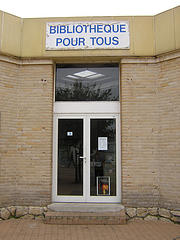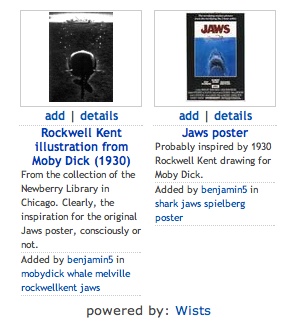Google is riding high. With nearly 50 percent market share, it is the most widely used search engine on the web. It is even beginning to act suspiciously like a portal (notice the “login” link tucked discretely in the upper right corner?), handling your mail, hosting your blog, helping you find files on your desktop, and even storing a history of all your web searches. (No doubt, Google’s expansion into web-based applications has Microsoft scared – they’ve always considered software their turf.) Google recently patented a system that ranks news searches by the quality and credibility of the source. Gorgeous satellite maps have put the surface of the earth in our web browser and left people breathless (see the Google Sightseeing blog, or the memorymap tag on Flickr as examples of sheer exultation in seeing the world through Google maps). Late last year, Google announced plans to digitize and put online major portions of the libraries of Stanford, U. Michigan, Harvard, Oxford and the NY Public Library. And on top of all this, its stock has continued to soar. Already this year, the newly public company shattered predictions, earning $369.1 million in the first quarter alone, more than covering the cost of the projected 10-year library scanning project. It seems there is no limit to what Google might do.
 That is precisely what has Europeans so worried. Across the Atlantic, Google is coming to be seen as yet another symbol of American cultural hegemony, bestriding the web like a colossus. And the library project touches a particularly sensitive nerve, raising questions of cultural heritage – and cultural destiny. If the future of libraries is solely in Google’s hands, what will be left out in the process? Will English become the lingua franca not only for politics and commerce, but for all intellectual discourse? Not content simply to ask questions, Europe has responded. In February, Jean-Noel Jeanneney, chief librarian of the Bibliothè que Nationale de France, warned that Google Print would effectively anglicize the world’s knowledge, and called for a French digitization effort to beat back the surging english tide. Less than a month later, President Jacques Chirac gave Jeanneney’s proposal the green light. Then, last week, nineteen national libraries, evidently moved by France’s determination, signed a joint motion urging the creation of a giant pan-European digital library to counterbalance the nascent Googlian stacks. A couple days ago, 16 EU culture ministers, several heads of state, and over 800 artists and intellectuals met in Paris to close the deal, issuing a strong, continent-wide directive to preserve and promote culture, beginning with the digitization of European library collections.
That is precisely what has Europeans so worried. Across the Atlantic, Google is coming to be seen as yet another symbol of American cultural hegemony, bestriding the web like a colossus. And the library project touches a particularly sensitive nerve, raising questions of cultural heritage – and cultural destiny. If the future of libraries is solely in Google’s hands, what will be left out in the process? Will English become the lingua franca not only for politics and commerce, but for all intellectual discourse? Not content simply to ask questions, Europe has responded. In February, Jean-Noel Jeanneney, chief librarian of the Bibliothè que Nationale de France, warned that Google Print would effectively anglicize the world’s knowledge, and called for a French digitization effort to beat back the surging english tide. Less than a month later, President Jacques Chirac gave Jeanneney’s proposal the green light. Then, last week, nineteen national libraries, evidently moved by France’s determination, signed a joint motion urging the creation of a giant pan-European digital library to counterbalance the nascent Googlian stacks. A couple days ago, 16 EU culture ministers, several heads of state, and over 800 artists and intellectuals met in Paris to close the deal, issuing a strong, continent-wide directive to preserve and promote culture, beginning with the digitization of European library collections.
More serious digitization projects are undoubtedly a good thing. The European effort, being a more purely civic enterprise, might in fact turn out far better than Google Print, which clearly has a large commercial dimension (deals with publishers, advertising etc.). The Euro initiative might produce bona fide electronic editions, not just searchable scans – fully structured, annotated and perhaps employing other scholarly resources (but let’s not hold our breath). To be fair, Google has never said it wants to be the only gig in town. Rather, they hope to act as a catalyst for other digitization efforts. And judging by Europe’s reaction, it seems to be working. Looking at this latest transatlantic folly, it’s funny to think of the Bush administration trying to undercut European unity, splitting the continent into “old” and “new” in the hope of fishing out support for the Iraq war. We’ve seen where that kind of destructive diplomacy has led us. But quite wonderfully, Google appears to have achieved the opposite, galvanizing a united Europe with a big, visionary idea. If the Euro library project exists for no other reason than the perceived imperialism of Google, then so be it. It will result in a great gift for all. If only our foreign policy were so deft.
(image by libraryman via Flickr)



 There’s a nice
There’s a nice  That is precisely what has Europeans so worried. Across the Atlantic, Google is coming to be seen as yet another symbol of American cultural hegemony, bestriding the web like a colossus. And the library project touches a particularly sensitive nerve, raising questions of cultural heritage – and cultural destiny. If the future of libraries is solely in Google’s hands, what will be left out in the process? Will English become the lingua franca not only for politics and commerce, but for all intellectual discourse? Not content simply to ask questions, Europe has responded. In February, Jean-Noel Jeanneney, chief librarian of the
That is precisely what has Europeans so worried. Across the Atlantic, Google is coming to be seen as yet another symbol of American cultural hegemony, bestriding the web like a colossus. And the library project touches a particularly sensitive nerve, raising questions of cultural heritage – and cultural destiny. If the future of libraries is solely in Google’s hands, what will be left out in the process? Will English become the lingua franca not only for politics and commerce, but for all intellectual discourse? Not content simply to ask questions, Europe has responded. In February, Jean-Noel Jeanneney, chief librarian of the